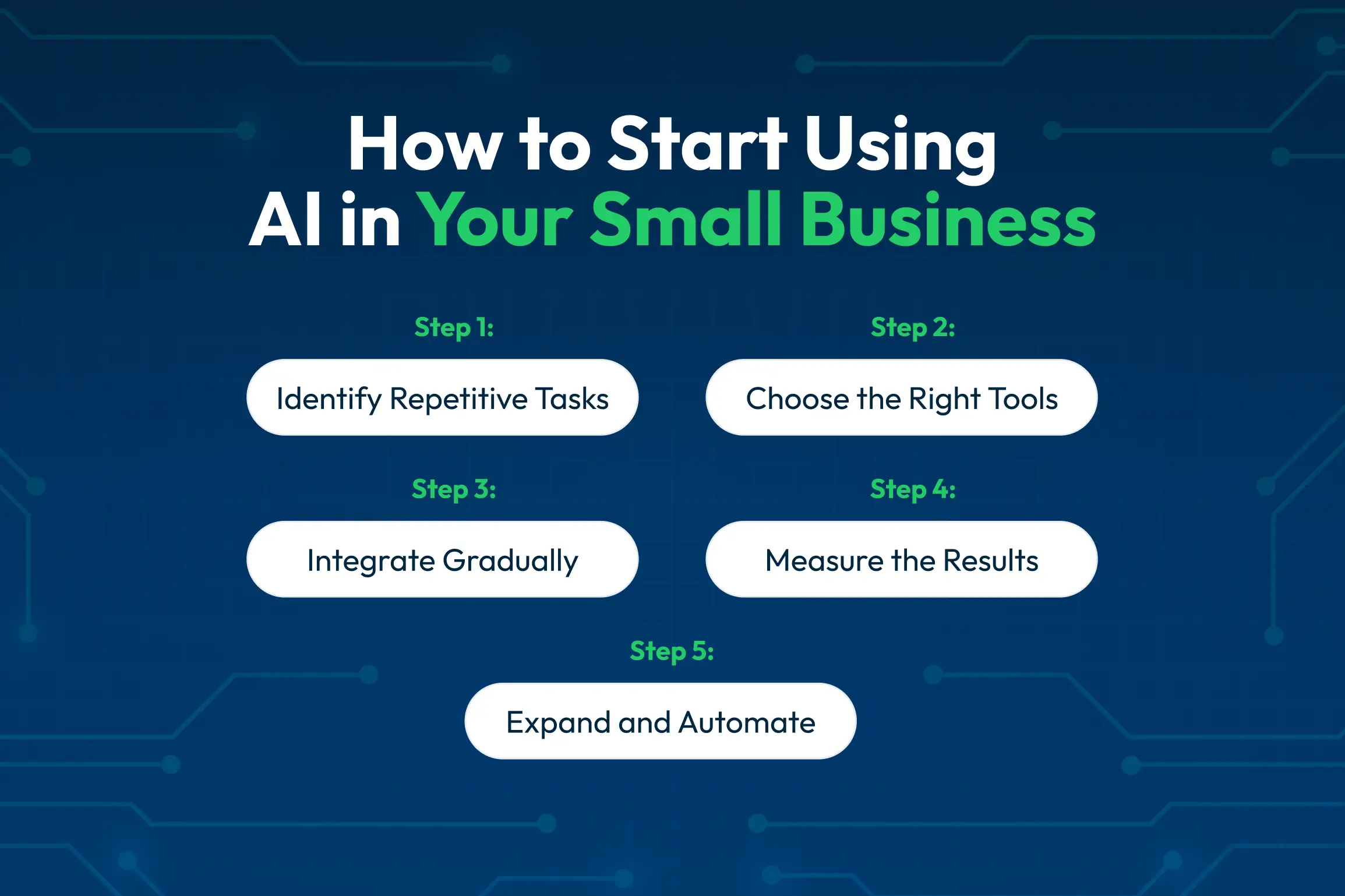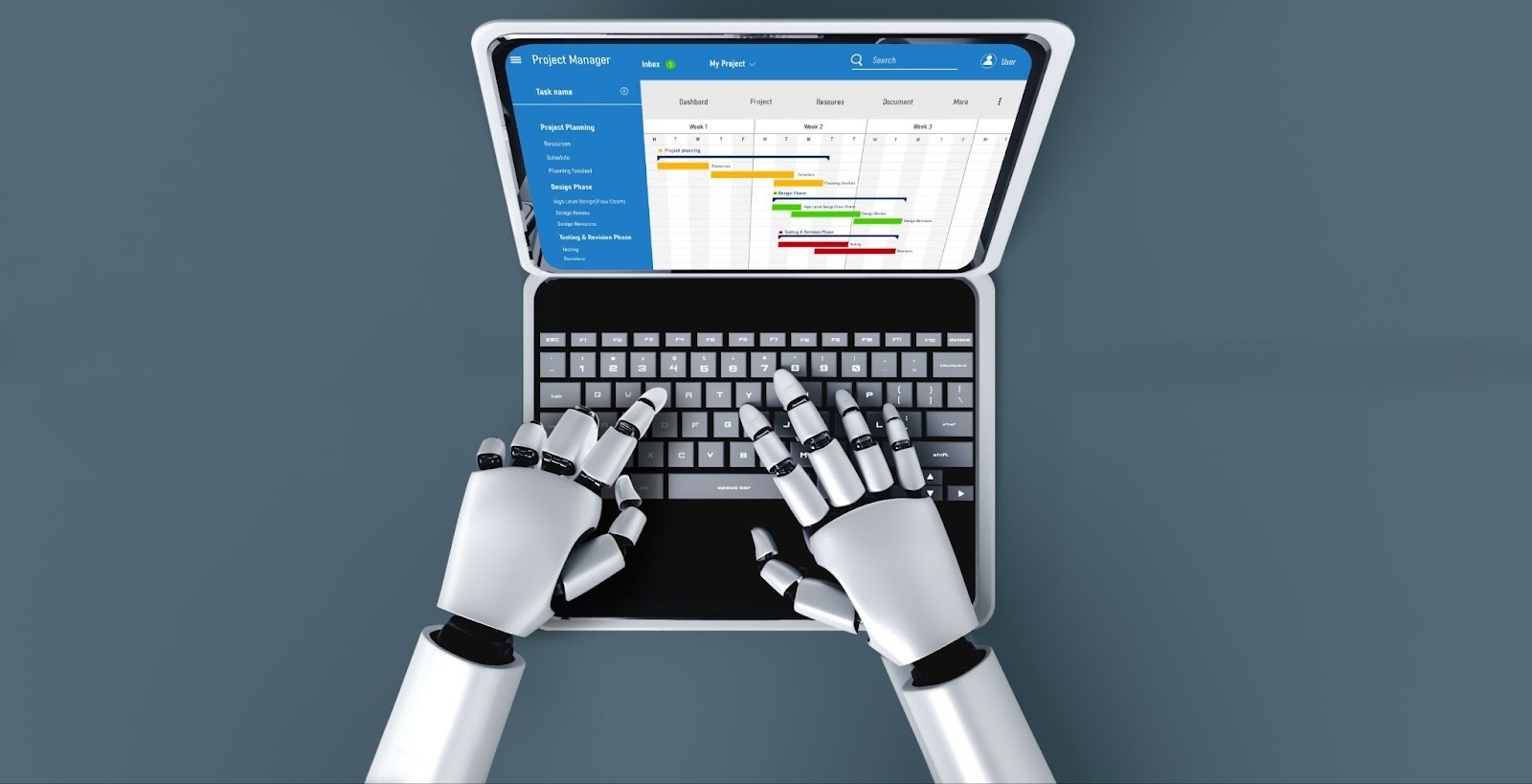
Small businesses across every industry, from local coffee shops to home service providers are using AI tools to simplify work, make smarter decisions, and save hours each week.
If you’ve ever wished you had extra help keeping up with customers, managing finances, or running marketing campaigns, AI can step in as that reliable support. AI can help small business owners stay organized, work faster, and focus on what matters most — serving their customers and growing their business.
In this guide, we’ll explore what AI for small business really means, how it’s being used today, and how you can start using it in your own company without needing to be a tech expert.
What is AI for Small Business?
Artificial intelligence (AI) for small business means using large language models (LLMs) to analyze data, automate repetitive work, and help owners make smarter decisions. These systems learn from your business over time—spotting patterns, uncovering insights, and helping you save time, reduce costs, and run your operations more efficiently.
AI differs from conventional software because it doesn't simply execute rules; it learns. It becomes wiser over time by identifying patterns within your data, assisting in anticipating customer demands, minimizing wastage, and recognizing new opportunities.
Here are a few examples of what small business AI tools can do:
- Chatbots that respond to customers 24/7
- Algorithms that predict which customers are most likely to buy
- Automations that handle invoicing, reminders, and scheduling
- Analytics tools that measure marketing performance in real time
How AI Is Changing the Way Small Businesses Operate
Artificial intelligence — large language models (LLMs) in particular — is transforming the way small businesses operate on a daily basis. What used to take hours to do manually can now be done in minutes.
Efficiency at Scale
AI tools can take over repetitive administrative tasks, such as data entry, report generation, or follow-up emails. This frees up business owners and employees to focus on strategy, creativity, and customer relationships.
Cost Savings
Instead of hiring additional staff, AI tools for small businesses can run workflows 24/7 at a fraction of the cost. By automating operations, companies can reduce overhead while maintaining productivity and service quality.
Data-Driven Decisions
AI provides real-time insights into your business performance. Rather than relying on gut instinct, owners can make informed decisions using data from customer behavior, marketing campaigns, and financial results.
Improved Customer Experience
AI makes personalization possible at scale. From sending tailored product recommendations to remembering customer preferences, small businesses can now deliver the same level of experience as major brands — and often with greater authenticity.
Competitive Advantage
AI helps small businesses stay ahead of the curve by identifying opportunities, predicting market trends, and reacting quickly to changes in customer demand. With the right AI systems in place, small businesses can move faster and compete more effectively than ever before.
Practical Use Cases of AI for Small Business
Artificial intelligence can be applied to nearly every part of a small business, no matter the industry. Below are some of the most common—and most impactful—ways small businesses are using AI today.
AI in Marketing and Sales
Marketing is one of the easiest areas where small businesses can experience the benefits of AI.
AI tools for marketing and sales can:
- Create personalized ads based on audience behavior
- Automate email campaigns and optimize them for engagement
- Write and test ad copy using large language models
- Analyze campaign performance across multiple channels
Example:
A small ecommerce brand might use AI to track which products a customer views, then automatically send a follow-up email with a personalized discount code or reminder.
AI in Customer Service
Customer expectations have changed—they now expect fast, helpful responses anytime, anywhere.
AI chatbots and voice assistants can answer FAQs, schedule appointments, and pass complex issues to human agents when needed.
Benefits include:
- 24/7 customer support without extra payroll
- Reduced response and wait times
- Consistent, accurate information
- Improved satisfaction and retention
Example:
A salon could use an AI assistant on its website to book appointments, confirm availability, and send reminders—saving hours of manual coordination each week.
AI in Operations and Administration
AI can streamline the “back office” just as effectively as it enhances the customer experience.
Use cases include:
- Automated scheduling and calendar management
- Invoice generation and payment reminders
- Inventory forecasting and reordering
- Document summarization and data entry
Example:
A small logistics company might use AI to automatically track shipments, create invoices, and send payment reminders—without manual effort.
AI in Finance and Accounting
AI-powered financial tools can analyze transactions, identify trends, and flag unusual activity to help owners make smarter financial decisions.
Applications include:
- Automated bank reconciliation
- Cash flow forecasting
- Expense optimization
- Predictive financial modeling
Example:
A freelance designer could use an AI tool that categorizes transactions automatically and sends alerts when monthly spending exceeds a set limit.
AI in Human Resources and Recruiting
As small businesses grow, hiring and managing staff can become time-consuming. AI simplifies these processes through automation and predictive insights.
AI tools can:
- Screen resumes and match candidates to roles
- Automate onboarding paperwork
- Predict employee turnover risks
- Manage payroll and scheduling
Example:
A marketing agency might use AI to filter hundreds of resumes and surface the best candidates based on skills, experience, and fit—reducing hiring time by up to 70%.
AI in Customer Retention
Customer retention often delivers higher returns than new acquisition.
AI for small business helps monitor customer engagement, detect churn risks, and trigger automated retention actions.
Examples include:
- Rewarding loyal customers with exclusive offers
- Sending win-back messages to inactive users
- Recommending complementary products or services
Example:
A gym could use AI to notice when members stop checking in and automatically send motivational messages or limited-time promotions to re-engage them.
Challenges Small Businesses Face When Adopting AI
While the benefits of AI for small business are clear, many owners still face challenges when getting started. Understanding these common obstacles can make the transition smoother and more effective.
Lack of Understanding
AI can feel intimidating or overly technical. Many small business owners aren’t sure where to start, which tools to use, or how AI can fit into their daily operations.
Integration with Existing Systems
Some worry that new AI tools won’t connect easily with their current software — such as CRMs, accounting systems, or scheduling platforms. Integration is often simpler than it seems, but it can still require upfront setup.
Cost Concerns
Some worry that new AI tools won’t connect easily with their current software — such as CRMs, accounting systems, or scheduling platforms. Integration is often simpler than it seems, but it can still require upfront setup.
Data Quality
Some worry that new AI tools won’t connect easily with their current software — such as CRMs, accounting systems, or scheduling platforms. Integration is often simpler than it seems, but it can still require upfront setup.
Change Management
Some worry that new AI tools won’t connect easily with their current software — such as CRMs, accounting systems, or scheduling platforms. Integration is often simpler than it seems, but it can still require upfront setup.

How to Start Using AI in Your Small Business
If you’re new to AI, the key is to start small, experiment, and build confidence as you go. You don’t need to be a tech expert to benefit from AI — many tools are designed for everyday business owners.
Step 1: Identify Repetitive Tasks
Start by listing out the tasks that take up time but don’t require much creativity — like appointment scheduling, lead follow-ups, or sending invoice reminders. These are perfect areas to automate with AI.
Step 2: Choose the Right Tools
Look for AI tools for small business that solve one clear problem. Focus on something simple and measurable, such as automating emails or managing customer inquiries. Avoid large, complex systems when you’re just getting started.
Step 3: Integrate Gradually
Test your new AI tool on a single process or department first. Once you’re confident it’s working well, expand it across your business. This step-by-step approach reduces risk and helps your team adapt more easily.
Step 4: Measure the Results
Track the impact of your AI tool using metrics like time saved, cost reduction, improved response rates, or higher conversions. These measurements help you understand your return on investment (ROI) and justify further adoption.
Step 5: Expand and Automate
Once you see measurable benefits, expand your use of AI into other areas such as marketing, finance, or customer experience. Over time, AI can become a natural part of how your business operates day to day.
The Future of AI in Small Business
The next wave of AI won’t just automate — it will collaborate.
Small businesses are entering the AI Agent Era, where intelligent agents can handle specific functions on their own while working together seamlessly.
Imagine running your business with:
- An AI agent managing customer support
- Another qualifying leads and handling outreach
- One tracking finances and forecasting cash flow
- Another creating social media posts and email campaigns
These agents can communicate, share data, and operate together like a real team — making small businesses faster, smarter, and more competitive than ever before.
AI will also become more conversational and intuitive. Instead of spending time navigating dashboards or spreadsheets, owners will simply ask questions like:
“Show me my sales trends for last quarter.”
“Send reminders to clients with overdue invoices.”
And the system will take care of it instantly.
The future of AI for small business isn’t about replacing people — it’s about giving business owners more time to focus on creativity, relationships, and growth.
Ethical and Practical Considerations
As AI becomes more integrated into daily operations, small businesses must also think carefully about privacy, transparency, and fairness. Using AI responsibly not only builds trust with customers but also ensures long-term success.
Data Privacy
Always ensure that your AI tools for small business comply with major data protection laws, such as GDPR or CCPA. Be transparent about how customer data is collected, stored, and used. Clear communication fosters trust and helps prevent compliance issues.
Human Oversight
AI is powerful, but it should support human judgment — not replace it. Keep people involved in key decisions such as pricing, client communication, and strategy. A balance between automation and human insight ensures accuracy and accountability.
Bias and Accuracy
AI models learn from data, and if that data includes bias or gaps, the results can be misleading. Regularly review AI-generated outputs to maintain fairness, accuracy, and reliability. Ethical oversight is just as important as technical performance.
Making AI Work for You
AI is no longer optional — it’s the foundation of running a modern, competitive small business.
By implementing AI strategically, you can automate repetitive work, make smarter decisions, and deliver a better experience for every customer.
You don’t need a technical team or a huge budget to get started. All you need is the right tool — and the willingness to evolve.
That’s where Leapify comes in.
Leapify simplifies AI for small businesses by bringing CRM, marketing, finance, and customer engagement together into one intelligent platform. It’s built for business owners who want to make informed decisions without dealing with technical complexity.
If you’re ready to explore what AI can do for your business, visit Leapify.com and start building the smarter, more efficient business you’ve always envisioned.



